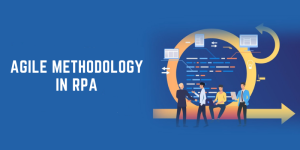Agile methodology is a popular approach to software development that emphasizes flexibility and collaboration between development teams and their stakeholders. In recent years, many organizations have adopted Agile methodology and applied it to Robotic Process Automation (RPA) projects. This blog will discuss the basics of Agile methodology and how it can be applied to RPA projects. Additionally, for those interested in enhancing their skills, RPA Training in Chennai at FITA Academy provides valuable resources and courses for further understanding and implementation.
What is Agile Methodology?
Agile methodology is an iterative approach to software development that values customer collaboration, responding to change, and working software as the primary measure of progress. The Agile methodology is based on the Agile Manifesto, created by a group of software developers in 2001. The Agile Manifesto emphasizes four key values:
– Individuals and interactions over processes and tools
– Working software over comprehensive documentation
– Customer collaboration over contract negotiation
– Responding to change over following a plan
The Agile methodology is designed to be flexible and adaptable, allowing development teams to respond to changing requirements and stakeholder feedback.
Agile Methodology in RPA
Robotic Process Automation is a technology that automates repetitive, rule-based tasks using software robots. RPA is becoming increasingly popular in organizations that want to automate their business processes and reduce costs. However, implementing RPA projects can be complex and challenging, especially when managing the development process.
Agile methodology can help organizations overcome these challenges by providing a framework for managing RPA projects. Using Agile methodology, RPA development teams can work more collaboratively with their stakeholders and respond more quickly to changing requirements. Additionally, incorporating RPA Classes into the process can enhance team skills and proficiency in robotic process automation techniques.
Agile methodology provides several benefits for RPA projects, including
- Flexibility: Agile methodology allows RPA development teams to be more flexible and adaptable to changing requirements. This is particularly important in RPA projects where processes can change frequently.
- Collaboration: Agile methodology promotes collaboration between RPA development teams and their stakeholders, including business users and IT teams. This collaboration helps ensure that RPA solutions meet the business’s needs.
- Early delivery of value: Agile methodology emphasizes delivering working software as the primary measure of progress. This means that RPA development teams can deliver value to the business early in development.
- Continuous improvement: Agile methodology encourages continuous improvement through regular feedback and retrospectives. This helps RPA development teams identify improvement areas and change their processes.
Agile Methodology Frameworks
Several Agile methodology frameworks can be applied to RPA projects, including:
- Scrum: Scrum is a popular Agile methodology framework that emphasizes collaboration, flexibility, and continuous improvement. It is based on sprints, which are short development cycles that typically last 1-4 weeks.
- Kanban: Kanban is another Agile methodology framework emphasising flexibility and continuous improvement. Kanban is based on visualizing work, limiting work in progress, and delivering value as quickly as possible.
- Lean: Lean is an Agile methodology framework that emphasizes the elimination of waste and continuous improvement. Lean is based on delivering value to the customer as quickly as possible while minimizing waste.
Agile methodology is a powerful approach to software development that can be applied to RPA projects. Using Agile methodology, RPA development teams can work more collaboratively with their stakeholders, respond more quickly to changing requirements, and deliver value to the business early in the development process. Several Agile methodology frameworks can be applied to RPA projects, including Scrum, Kanban, and Lean. Organizations implementing RPA projects should consider using Agile methodology to help them manage the development process and deliver successful RPA solutions. Additionally, Training Institutes in Chennai offer courses in Agile methodology that can further enhance the capabilities of RPA development teams.
Also Read: RPA Interview Questions and Answers

